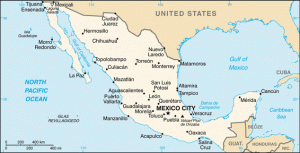Thirty-five dead bodies were dumped close to the port of Veracruz in Mexico on Tuesday along with a threatening message to Mexico’s most notorious drug cartel, as drug-related gang violence continues to rise in the region.
The banner found nearby read “This is going to happen to all you Zeta shits operating in Veracruz. The territory now has a new boss.” Many of the dead bodies have confirmed links to organized crimes, although their gang loyalties are not yet known. If the corpses turn out to be members of the Zetas gang, this would mark the most dramatic counterattack yet in Mexico’s gang violence.
The Zetas are a paramilitary-style group founded by defectors of the US-trained special forces, and they have recently been expanding their turf in Mexico to previously peaceful locales, like Veracruz. Zetas also have ties to US-trained and funded Kaibiles, Guatemalan elite forces well known for their record of human rights abuses.
President Felipe Calderon’s effort to to crack down on the cartels has resulted in more than 42,000 dead in less than five years, and an increasingly militaristic state apparatus that seems only to inflame the violence. In his speech to the United Nations on Wednesday, Calderon urged a new approach to the drug issue, one that will reduce the exorbitant profits in the black market, namely “market alternatives.”
But Mexico largley follows orders form the United States in this respect, who has balked at decriminalization efforts in the past, insisting instead on maintaining artificial soaring prices resulting from prohibition and on escalating the violence. Additionally, President Barack Obama’s administration is reportedly withholding information from high-ranking Mexican law enforcement officials regarding Operation Fast and Furious, the program in which the Bureau of Alcohol, Tobacco, Firearms and Explosives facilitated the sale of weaponry to drug gangs in a flawed effort to locate criminals.



